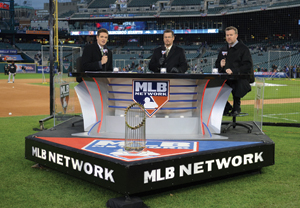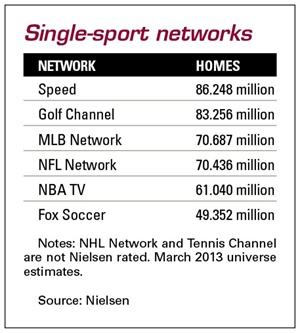Expect MLB Network executives to spend a lot of time in Philadelphia; El Segundo, Calif.; and Manhattan’s Time Warner Center during the next nine months.
That’s because the 4-year-old network’s affiliate deals with nearly every major distributor expire over the next two years. That includes deals with the industry’s biggest operators, including Philadelphia’s Comcast, El Segundo’s DirecTV and Time Warner Cable. When it launched on Jan. 1, 2009, MLB Network signed five-year carriage deals with distributors, sources said.
 |
MLB Network has been airing more live games, and critics like its programming.
Photo: GETTY IMAGES
|
The situation of having so many deals expire at the same time is somewhat unique in the pay-TV business. Many other distributors, like ESPN, Fox and NBC, stagger their affiliate deals so they do not all expire at the same time. That allows the networks to focus on each distributor, rather than all at once.
Sources said MLB has not started formal negotiations yet to renew its deals. But some distribution executives said they’ve had informal discussions with MLB executives about what to expect, which includes a higher license fee offset by a more robust Extra Innings package that will include TV Everywhere rights.
MLB now gets 27 cents a subscriber per month, according to SNL Kagan. Distribution executives say they expect MLB Network to try to double that fee, to around 50 cents.
At 50 cents a subscriber per month, MLB Network would be the fourth-most-expensive sports channel, according to SNL Kagan, behind ESPN ($5.47), NFL Network (88 cents) and ESPN2 (73 cents).
As an enticement to get distributors to renew their deals at a higher price, MLB Network will allow distributors to offer its Extra Innings out-of-market package online to authenticated subscribers. That could be done either through a TV Everywhere scenario, where subscribers of the package are given online access, or in partnership with MLB.TV, the league’s online out-of-market offering.
MLB was successful in tying Extra Innings — the out-of-market TV package — to MLB Network five years ago. At the time, it refused to sell Extra Innings to distributors that did not carry MLB Network. The package was TV only and did not allow for online access.
In the ensuing years, however, some cable operators started to sour on Extra Innings because of viewer erosion. Distributors do not release the specific number of people who subscribe to Extra Innings. But Time Warner Cable executives, in particular, have complained about a drop-off in Extra Innings subscribers since they originally did the deal.
Distributors believe that baseball’s MLB.TV out-of-market online product, which costs $129.99, undercuts their price and takes away potential subscribers. The cost of Extra Innings varies by provider. DirecTV, for example, charges $195.99 for it.
Distribution executives plan to use the channel’s ratings performance as a reason for trying to keep its license fee low. In 2012, MLB Network ranked 81st of 97 Nielsen-rated cable networks in prime time. For the year, the channel averaged a 0.1 rating and 106,000 viewers, placing it behind NFL Network and NBA TV. NHL Network is not Nielsen rated.
But MLB Network’s programming receives high marks from critics — particularly its “MLB Tonight,” which has won two consecutive Sports Emmys for studio shows. The channel has increased the number of live games it airs from 26 in the early days to more than 100. And its schedule has some popular annual programming, including exclusive MLB playoff games and exclusive World Baseball Classic games. Over the past several years, networks have used those types of high-profile games to gain carriage on cable and satellite operators.
MLB Network launched Jan. 1, 2009, to about 50 million homes, making it the biggest network launch in cable TV history, and it’s now in nearly 71 million homes. It has the highest distribution of any league-owned network, slightly ahead of the NFL Network.
In addition to using leverage from Extra Innings, MLB Network’s strategy of giving equity stakes helped it gain carriage.
MLB owns two-thirds of the channel. DirecTV hold a one-sixth stake and cable’s In Demand consortium of Comcast, Time Warner and Cox split the final one-sixth ownership stake.
MLB Network negotiations will be led by a trio of executives: Tim Brosnan, MLB executive vice president of business; MLB Network President and CEO Tony Petitti; and Chris Tully, MLB senior vice president of broadcasting.





